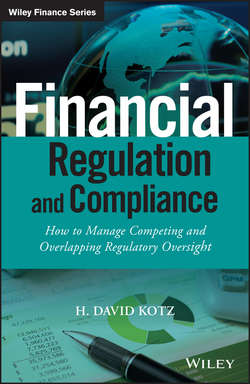Читать книгу Financial Regulation and Compliance - Kotz H. David - Страница 14
На сайте Литреса книга снята с продажи.
CHAPTER 1
Jurisdiction of Regulators – Who Regulates Whom and What
1.5 THE NATIONAL FUTURES ASSOCIATION (NFA)
ОглавлениеThe National Futures Association (“NFA”) is the industry-wide, self-regulatory organization for the U.S. futures industry and the “designated” regulatory organization for non-clearing FCMs.30 The NFA screens all firms and individuals wishing to register with the CFTC and become members of the NFA. Applicants must meet fitness requirements to determine if they have ever been disciplined or subject to regulatory proceedings in the past, and must provide fingerprint cards for Federal Bureau of Investigation (“FBI”) background checks. In addition, individual registrants must pass proficiency testing requirements. The NFA has the authority to deny, revoke, suspend, restrict, or condition the registration of any firm or individual.
The NFA has adopted a comprehensive set of rules covering the business conduct of its members, including sales practices, recordkeeping, reporting, risk disclosure, discretionary trading, disclosure of fees, and minimum capital requirements.
Pursuant to its examination or audit program, the NFA is required to examine FCMs on an annual basis if they hold customer funds.31 As part of these examinations or audits, the NFA examination may include all the FCM's procedures, books, and records associated with its commodities business, including, but not limited to:32
■ Corporate records.
■ Anti-money laundering policies and practices.
■ Sales practices.
■ Supervisory procedures.
■ Account opening documents.
■ Order tickets.
■ Bunched order allocations.
■ Margin policies.
■ Promotional material.
■ Disclosure documents.
■ Performance capsule support.
■ Bank records.
■ Trading records.
■ Financial statement records.
In addition, the NFA has the authority to take disciplinary actions against any firm or individual that violates its rules. These actions range from Warning Letters for minor rule infractions to formal complaints in cases where rule violations warrant prosecution. Penalties resulting from complaints include expulsion, suspension for a fixed period, prohibition from future association with any NFA Member, censure, reprimand, and a fine of up to $250,000 per violation. The NFA often collaborates with the CFTC, and other law enforcement Agencies to ensure full, comprehensive prosecutions.33
The NFA has also worked closely with the CFTC and other SROs to adopt a number of initiatives to further safeguard customer funds. The NFA, in conjunction with other SROs, developed and implemented a system in 2013 that requires all depositories holding customer segregated funds on behalf of an FCM to directly report balances daily to SROs. The SROs then perform an automated comparison to the daily reports filed by the FCMs to identify any suspicious discrepancies. In addition, each FCM is required to provide regulators with immediate notification if it draws down its excess segregated funds (funds deposited by the firm into customer segregated accounts to guard against customer defaults) by 25 percent in any given day. Such withdrawals must be approved by the Chief Executive Officer (“CEO”), Chief Financial Officer (“CFO”) or a financial principal of the firm, and the principal must certify that the firm remains in compliance with segregation requirements.34
All FCMs also must regularly file certain financial information about the firm with the NFA. This information is posted on the NFA's website. The information includes each FCM's capital requirement, excess capital, segregated funds requirement, excess segregated funds, and how the firm invests customer segregated funds.35
The NFA also began an arbitration program in 1983, providing a method for investors to resolve futures-related disputes. Since that time, NFA arbitration has become the primary venue for dispute resolution for retail futures and foreign exchange (“forex”) customers. The NFA also offers a mediation alternative during the arbitration process in cases where the total amount of the arbitration claim is $150,000 or less.36
30
For further background on FINRA, see www.nfa.futures.org/.
31
See http://www.nfa.futures.org/NFA-faqs/compliance-faqs/examinations/index.HTML.
32
See ibid.
33
See http://www.nfa.futures.org/NFA-about-nfa/who-we-are/how-NFA-fights-fraud-and-abuse.HTML.
34
See http://www.nfa.futures.org/NFA-about-nfa/who-we-are/customer-protection-initiatives.HTML.
35
See ibid.
36
Mediation is a settlement process in which the parties work together with a mediator to find a mutually agreeable solution. For further information on the NFA's arbitration programs, see http://www.nfa.futures.org/%5C/NFA-about-nfa/who-we-are/dispute-resolution.HTML.
